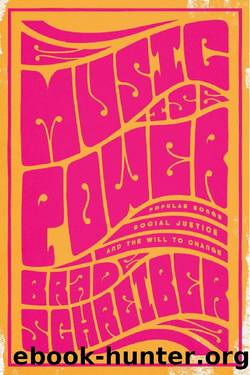Music Is Power: Popular Songs, Social Justice, and the Will to Change by Brad Schreiber

Author:Brad Schreiber [Schreiber, Brad]
Language: eng
Format: epub
Published: 2019-10-01T18:15:40+00:00
9
More Than a
Working- Class Hero
John Lennon and
The Beatles
In the history of popular music, there has never been a group as culturally influential as The Beatles. Author- journalist Anthony DeCurtis noted,
âBefore that, everything, you know, fashion, movies, music . . . it was always what the grownups liked and then filtered down to the kids. After a year or two, suddenly it was young people who were determining everything [cultural]. That started with The Beatles.â
The British Invasion, spearheaded by the arrival of The Beatles in the United States, came at a crossroads in political as well as cultural history.
The murder of President John F. Kennedy in November 1963 shocked a nation buoyed by the glamour and magnetism of the nationâs youngest leader.
A concatenation of circumstances led up to the ecstasy of Beatlemania.
The groupâs harmonies rivaled The Beach Boys, their screams far exceeded what girls heard from Elvis Presley, and to top off the package, their 121
122 ⢠Music Is Power
Liverpudlian accents and humor provided a fresh kind of charm. In terms of market penetration, without a plethora of channels or the internet, the February 1964 appearance of The Fab Four on The Ed Sullivan Show was seen by a record seventy- three million people, more than a third of the American population at the time. Each time the band hit high notes or shook their mop tops, it was greeted with shrieking that only acts like Elvis or Frank Sinatra had received up to that point.
Fans discussed which Beatle was their favorite one. While all four were quick- witted and pleasant, only one, during the early 1960s, had the temerity to hurl a lacerating bon mot right back in the face of the sometimes glib or downright rude American press corps.
JOURNALIST: Your haircuts look un- American.
JOHN LENNON: Well, thatâs very observant of you, actually, because weâre not American.
The Beatles were so far ahead of the cultural curve that most U.S. journalists who questioned them in the beginning knew little of British pop music and werenât even close to the band members in age. While Bob Dylan also faced the same problems in his first U.K. tour, there were four Beatles, and they were ready with generally good- natured ripostes, except when John Winston Lennon got his hackles up.
A 1964 decision reflected the morality of the group, as The Beatles refused to play a segregated Gator Bowl in Jacksonville, Florida, but it was the acerbic Lennon who declared, âWe never play to segregated audiences and we arenât going to start now. . . . Iâd sooner lose our appearance money.â Their fame made Jacksonville back down, and their 1965 and 1966
tour contracts guaranteed integrated shows.
Their manager, Brian Epstein, ably tightened their presentation skills and clothed them in smart, matching outfits, bringing them fortuitously to the attention of George Martin at EMI (Electric and Musical Industries). But Epstein had more experience running his music stores, which explained not only why he gave away 90 percent of the merchandising rights but also why he
Download
This site does not store any files on its server. We only index and link to content provided by other sites. Please contact the content providers to delete copyright contents if any and email us, we'll remove relevant links or contents immediately.
The Goal (Off-Campus #4) by Elle Kennedy(12433)
Kathy Andrews Collection by Kathy Andrews(10520)
Diary of a Player by Brad Paisley(6866)
What Does This Button Do? by Bruce Dickinson(5527)
Assassin’s Fate by Robin Hobb(5237)
Big Little Lies by Liane Moriarty(4880)
Pale Blue Dot by Carl Sagan(4001)
Sticky Fingers by Joe Hagan(3454)
The Heroin Diaries by Nikki Sixx(2932)
The Death of the Heart by Elizabeth Bowen(2901)
Beneath These Shadows by Meghan March(2718)
The Help by Kathryn Stockett(2704)
Confessions of a Video Vixen by Karrine Steffans(2675)
How Music Works by David Byrne(2526)
Jam by Jam (epub)(2489)
Harry Potter 4 - Harry Potter and The Goblet of Fire by J.K.Rowling(2416)
Strange Fascination: David Bowie: The Definitive Story by David Buckley(2367)
Petty: The Biography by Warren Zanes(2237)
Darker Than the Deepest Sea by Trevor Dann(2207)
